Organisational Behaviour: Analysis of Culture, Motivation, and Power
VerifiedAdded on 2020/12/30
|16
|4975
|144
Report
AI Summary
This report provides an analysis of organisational behaviour, examining the influence of culture, politics, and power on individual and team dynamics within A David & Co Limited. It evaluates various motivational theories and techniques, including Maslow's Hierarchy of Needs and Herzberg's Two-Factor Theory, to enable the achievement of organisational goals. The report also explores the characteristics of effective teams and the application of organisational behaviour concepts. It discusses the importance of HR management in managing and maintaining business operations, emphasizing aspects like power culture, role culture, task culture, and person culture. The report concludes by highlighting the role of HR in fostering employee motivation and job satisfaction to improve overall productivity and achieve desired outcomes. The analysis includes the impacts of political environments, reward and coercive power, and expert power on employees.
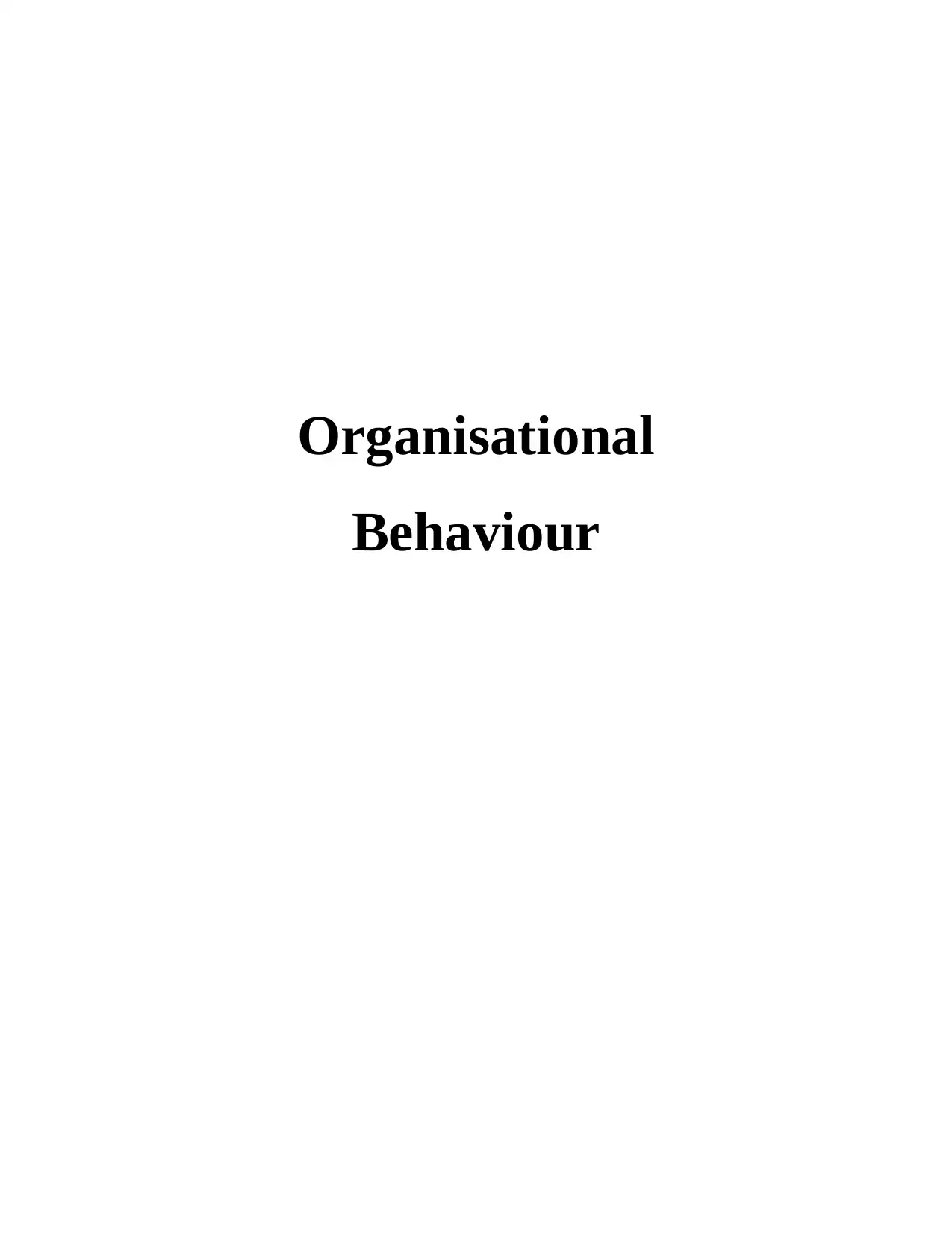
Organisational
Behaviour
Behaviour
Paraphrase This Document
Need a fresh take? Get an instant paraphrase of this document with our AI Paraphraser
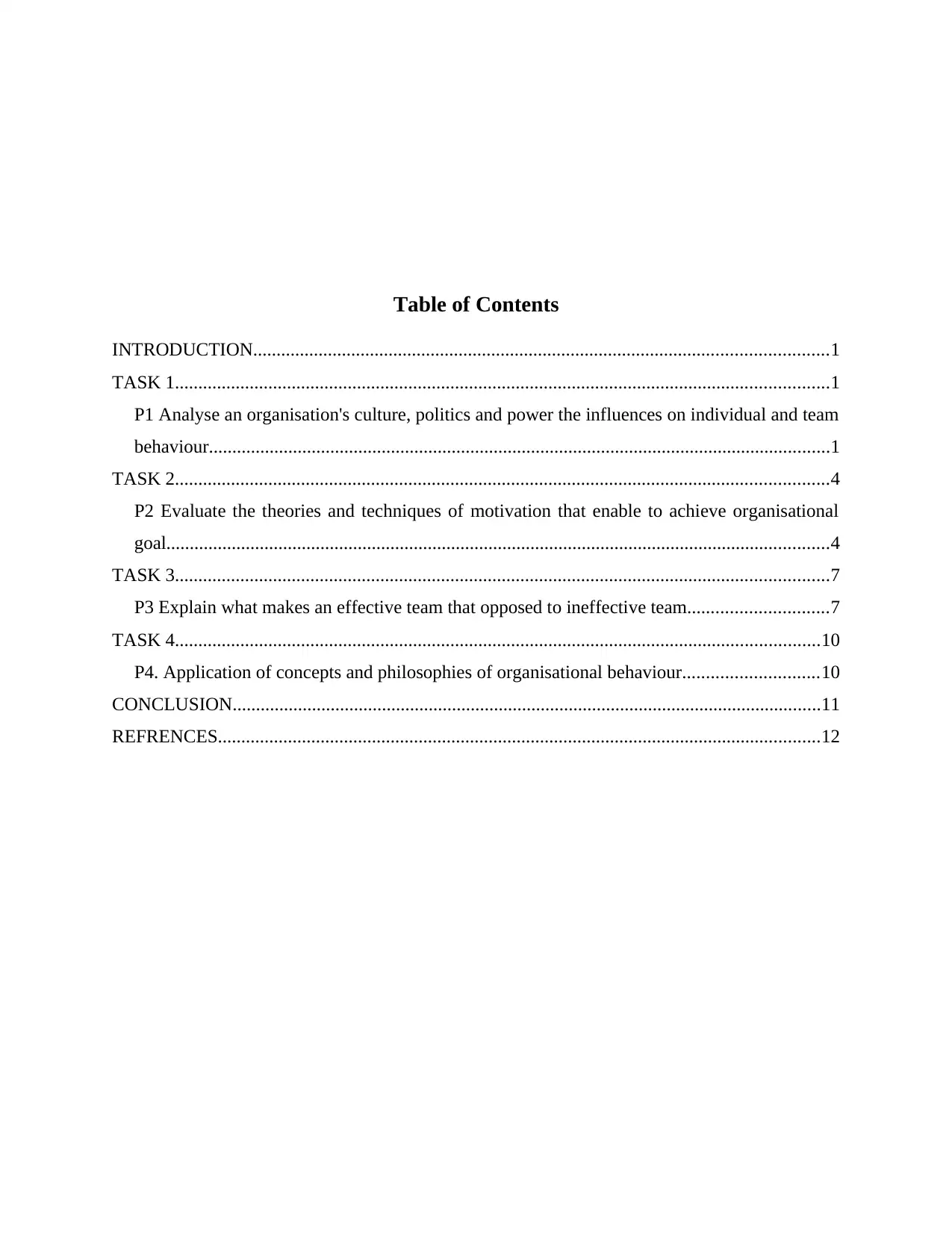
Table of Contents
INTRODUCTION...........................................................................................................................1
TASK 1............................................................................................................................................1
P1 Analyse an organisation's culture, politics and power the influences on individual and team
behaviour.....................................................................................................................................1
TASK 2............................................................................................................................................4
P2 Evaluate the theories and techniques of motivation that enable to achieve organisational
goal..............................................................................................................................................4
TASK 3............................................................................................................................................7
P3 Explain what makes an effective team that opposed to ineffective team..............................7
TASK 4..........................................................................................................................................10
P4. Application of concepts and philosophies of organisational behaviour.............................10
CONCLUSION..............................................................................................................................11
REFRENCES.................................................................................................................................12
INTRODUCTION...........................................................................................................................1
TASK 1............................................................................................................................................1
P1 Analyse an organisation's culture, politics and power the influences on individual and team
behaviour.....................................................................................................................................1
TASK 2............................................................................................................................................4
P2 Evaluate the theories and techniques of motivation that enable to achieve organisational
goal..............................................................................................................................................4
TASK 3............................................................................................................................................7
P3 Explain what makes an effective team that opposed to ineffective team..............................7
TASK 4..........................................................................................................................................10
P4. Application of concepts and philosophies of organisational behaviour.............................10
CONCLUSION..............................................................................................................................11
REFRENCES.................................................................................................................................12
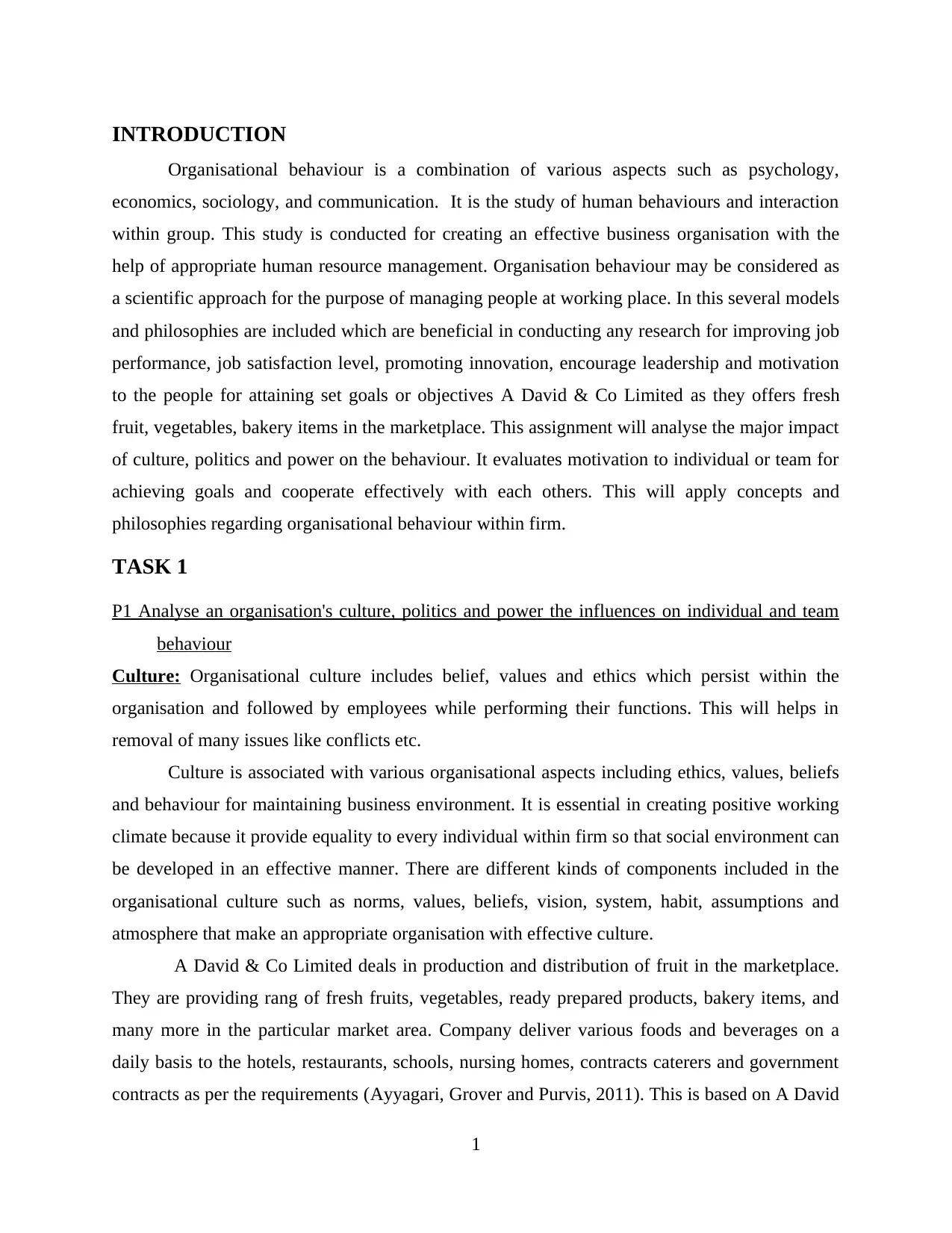
INTRODUCTION
Organisational behaviour is a combination of various aspects such as psychology,
economics, sociology, and communication. It is the study of human behaviours and interaction
within group. This study is conducted for creating an effective business organisation with the
help of appropriate human resource management. Organisation behaviour may be considered as
a scientific approach for the purpose of managing people at working place. In this several models
and philosophies are included which are beneficial in conducting any research for improving job
performance, job satisfaction level, promoting innovation, encourage leadership and motivation
to the people for attaining set goals or objectives A David & Co Limited as they offers fresh
fruit, vegetables, bakery items in the marketplace. This assignment will analyse the major impact
of culture, politics and power on the behaviour. It evaluates motivation to individual or team for
achieving goals and cooperate effectively with each others. This will apply concepts and
philosophies regarding organisational behaviour within firm.
TASK 1
P1 Analyse an organisation's culture, politics and power the influences on individual and team
behaviour
Culture: Organisational culture includes belief, values and ethics which persist within the
organisation and followed by employees while performing their functions. This will helps in
removal of many issues like conflicts etc.
Culture is associated with various organisational aspects including ethics, values, beliefs
and behaviour for maintaining business environment. It is essential in creating positive working
climate because it provide equality to every individual within firm so that social environment can
be developed in an effective manner. There are different kinds of components included in the
organisational culture such as norms, values, beliefs, vision, system, habit, assumptions and
atmosphere that make an appropriate organisation with effective culture.
A David & Co Limited deals in production and distribution of fruit in the marketplace.
They are providing rang of fresh fruits, vegetables, ready prepared products, bakery items, and
many more in the particular market area. Company deliver various foods and beverages on a
daily basis to the hotels, restaurants, schools, nursing homes, contracts caterers and government
contracts as per the requirements (Ayyagari, Grover and Purvis, 2011). This is based on A David
1
Organisational behaviour is a combination of various aspects such as psychology,
economics, sociology, and communication. It is the study of human behaviours and interaction
within group. This study is conducted for creating an effective business organisation with the
help of appropriate human resource management. Organisation behaviour may be considered as
a scientific approach for the purpose of managing people at working place. In this several models
and philosophies are included which are beneficial in conducting any research for improving job
performance, job satisfaction level, promoting innovation, encourage leadership and motivation
to the people for attaining set goals or objectives A David & Co Limited as they offers fresh
fruit, vegetables, bakery items in the marketplace. This assignment will analyse the major impact
of culture, politics and power on the behaviour. It evaluates motivation to individual or team for
achieving goals and cooperate effectively with each others. This will apply concepts and
philosophies regarding organisational behaviour within firm.
TASK 1
P1 Analyse an organisation's culture, politics and power the influences on individual and team
behaviour
Culture: Organisational culture includes belief, values and ethics which persist within the
organisation and followed by employees while performing their functions. This will helps in
removal of many issues like conflicts etc.
Culture is associated with various organisational aspects including ethics, values, beliefs
and behaviour for maintaining business environment. It is essential in creating positive working
climate because it provide equality to every individual within firm so that social environment can
be developed in an effective manner. There are different kinds of components included in the
organisational culture such as norms, values, beliefs, vision, system, habit, assumptions and
atmosphere that make an appropriate organisation with effective culture.
A David & Co Limited deals in production and distribution of fruit in the marketplace.
They are providing rang of fresh fruits, vegetables, ready prepared products, bakery items, and
many more in the particular market area. Company deliver various foods and beverages on a
daily basis to the hotels, restaurants, schools, nursing homes, contracts caterers and government
contracts as per the requirements (Ayyagari, Grover and Purvis, 2011). This is based on A David
1
⊘ This is a preview!⊘
Do you want full access?
Subscribe today to unlock all pages.

Trusted by 1+ million students worldwide
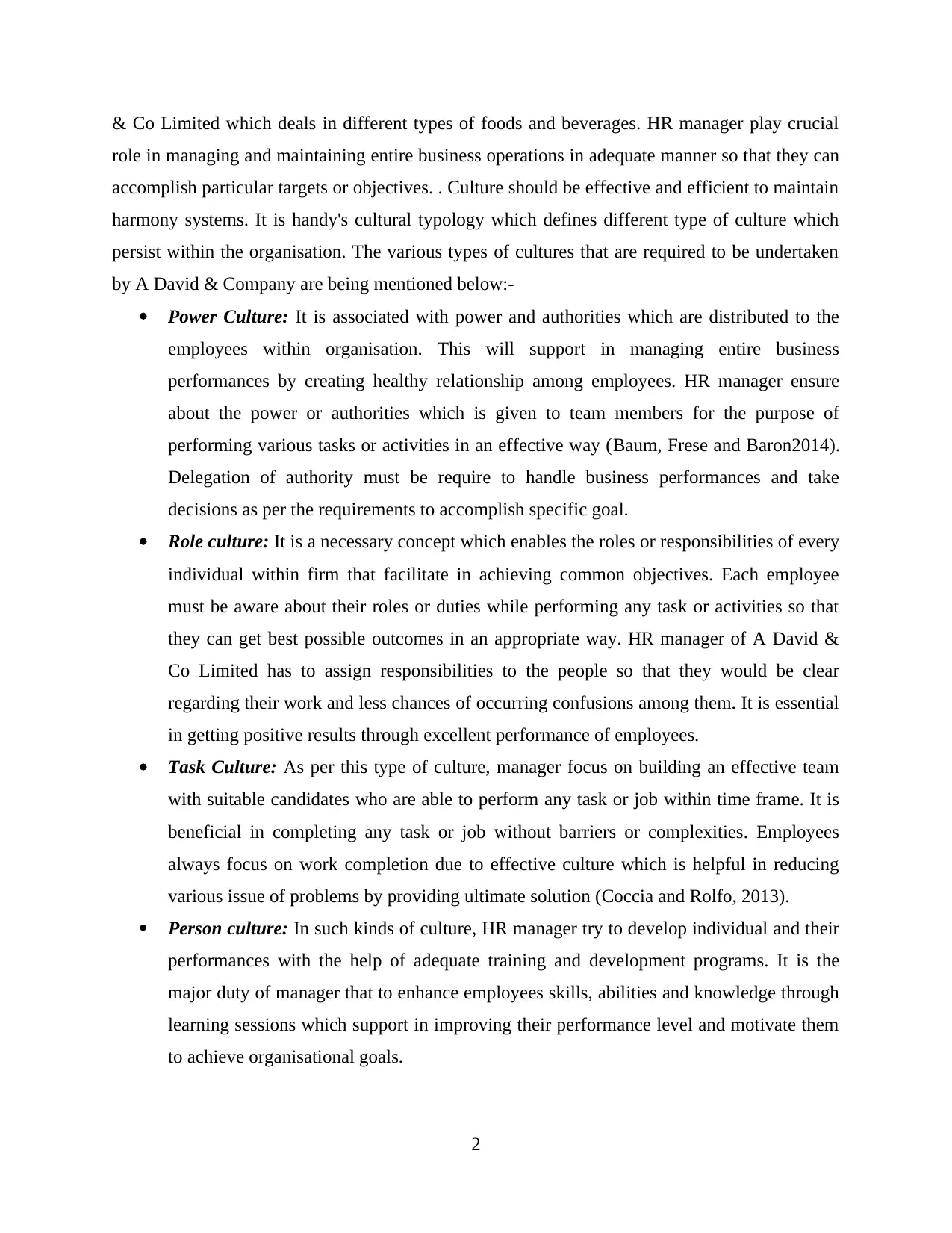
& Co Limited which deals in different types of foods and beverages. HR manager play crucial
role in managing and maintaining entire business operations in adequate manner so that they can
accomplish particular targets or objectives. . Culture should be effective and efficient to maintain
harmony systems. It is handy's cultural typology which defines different type of culture which
persist within the organisation. The various types of cultures that are required to be undertaken
by A David & Company are being mentioned below:-
Power Culture: It is associated with power and authorities which are distributed to the
employees within organisation. This will support in managing entire business
performances by creating healthy relationship among employees. HR manager ensure
about the power or authorities which is given to team members for the purpose of
performing various tasks or activities in an effective way (Baum, Frese and Baron2014).
Delegation of authority must be require to handle business performances and take
decisions as per the requirements to accomplish specific goal.
Role culture: It is a necessary concept which enables the roles or responsibilities of every
individual within firm that facilitate in achieving common objectives. Each employee
must be aware about their roles or duties while performing any task or activities so that
they can get best possible outcomes in an appropriate way. HR manager of A David &
Co Limited has to assign responsibilities to the people so that they would be clear
regarding their work and less chances of occurring confusions among them. It is essential
in getting positive results through excellent performance of employees.
Task Culture: As per this type of culture, manager focus on building an effective team
with suitable candidates who are able to perform any task or job within time frame. It is
beneficial in completing any task or job without barriers or complexities. Employees
always focus on work completion due to effective culture which is helpful in reducing
various issue of problems by providing ultimate solution (Coccia and Rolfo, 2013).
Person culture: In such kinds of culture, HR manager try to develop individual and their
performances with the help of adequate training and development programs. It is the
major duty of manager that to enhance employees skills, abilities and knowledge through
learning sessions which support in improving their performance level and motivate them
to achieve organisational goals.
2
role in managing and maintaining entire business operations in adequate manner so that they can
accomplish particular targets or objectives. . Culture should be effective and efficient to maintain
harmony systems. It is handy's cultural typology which defines different type of culture which
persist within the organisation. The various types of cultures that are required to be undertaken
by A David & Company are being mentioned below:-
Power Culture: It is associated with power and authorities which are distributed to the
employees within organisation. This will support in managing entire business
performances by creating healthy relationship among employees. HR manager ensure
about the power or authorities which is given to team members for the purpose of
performing various tasks or activities in an effective way (Baum, Frese and Baron2014).
Delegation of authority must be require to handle business performances and take
decisions as per the requirements to accomplish specific goal.
Role culture: It is a necessary concept which enables the roles or responsibilities of every
individual within firm that facilitate in achieving common objectives. Each employee
must be aware about their roles or duties while performing any task or activities so that
they can get best possible outcomes in an appropriate way. HR manager of A David &
Co Limited has to assign responsibilities to the people so that they would be clear
regarding their work and less chances of occurring confusions among them. It is essential
in getting positive results through excellent performance of employees.
Task Culture: As per this type of culture, manager focus on building an effective team
with suitable candidates who are able to perform any task or job within time frame. It is
beneficial in completing any task or job without barriers or complexities. Employees
always focus on work completion due to effective culture which is helpful in reducing
various issue of problems by providing ultimate solution (Coccia and Rolfo, 2013).
Person culture: In such kinds of culture, HR manager try to develop individual and their
performances with the help of adequate training and development programs. It is the
major duty of manager that to enhance employees skills, abilities and knowledge through
learning sessions which support in improving their performance level and motivate them
to achieve organisational goals.
2
Paraphrase This Document
Need a fresh take? Get an instant paraphrase of this document with our AI Paraphraser
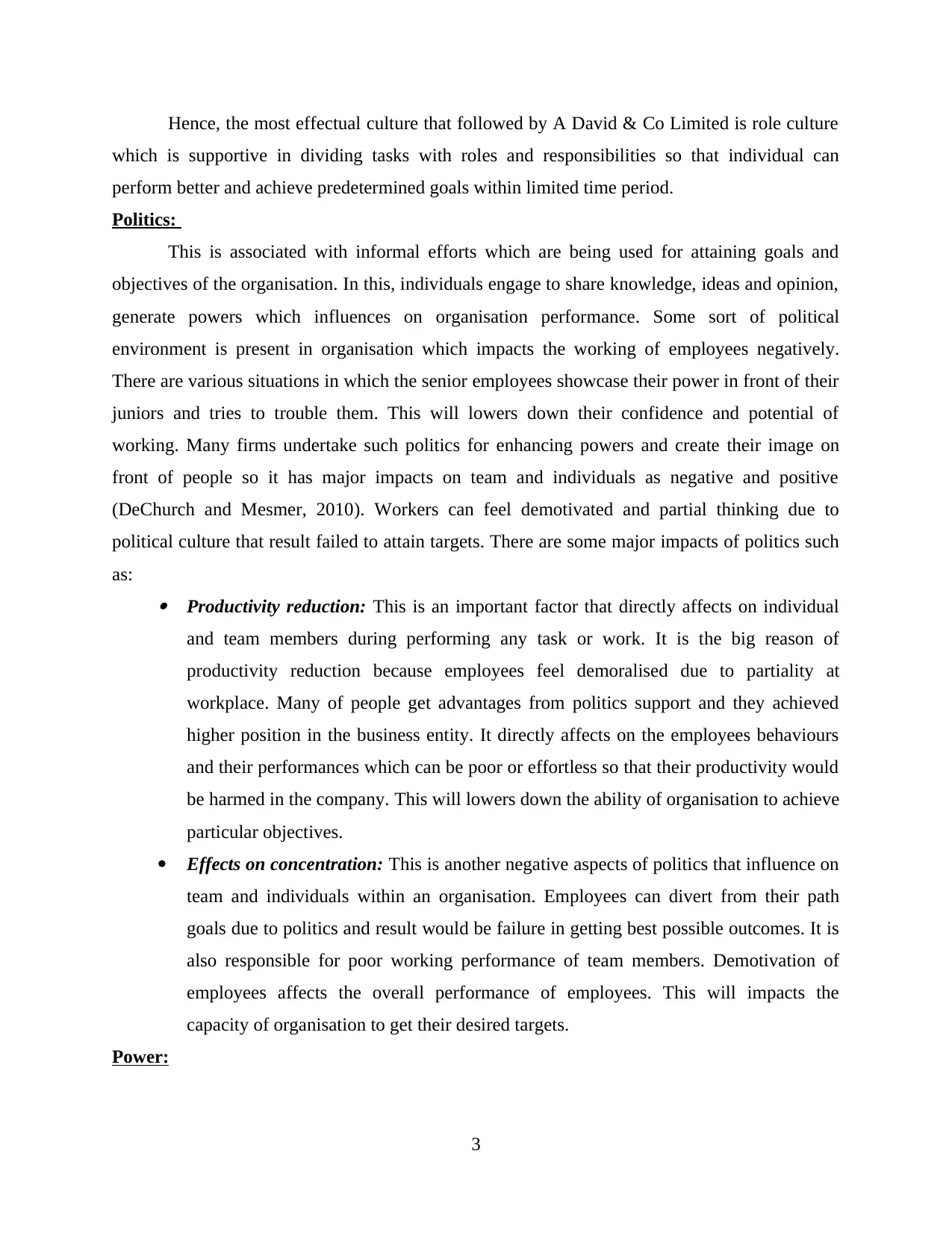
Hence, the most effectual culture that followed by A David & Co Limited is role culture
which is supportive in dividing tasks with roles and responsibilities so that individual can
perform better and achieve predetermined goals within limited time period.
Politics:
This is associated with informal efforts which are being used for attaining goals and
objectives of the organisation. In this, individuals engage to share knowledge, ideas and opinion,
generate powers which influences on organisation performance. Some sort of political
environment is present in organisation which impacts the working of employees negatively.
There are various situations in which the senior employees showcase their power in front of their
juniors and tries to trouble them. This will lowers down their confidence and potential of
working. Many firms undertake such politics for enhancing powers and create their image on
front of people so it has major impacts on team and individuals as negative and positive
(DeChurch and Mesmer, 2010). Workers can feel demotivated and partial thinking due to
political culture that result failed to attain targets. There are some major impacts of politics such
as: Productivity reduction: This is an important factor that directly affects on individual
and team members during performing any task or work. It is the big reason of
productivity reduction because employees feel demoralised due to partiality at
workplace. Many of people get advantages from politics support and they achieved
higher position in the business entity. It directly affects on the employees behaviours
and their performances which can be poor or effortless so that their productivity would
be harmed in the company. This will lowers down the ability of organisation to achieve
particular objectives.
Effects on concentration: This is another negative aspects of politics that influence on
team and individuals within an organisation. Employees can divert from their path
goals due to politics and result would be failure in getting best possible outcomes. It is
also responsible for poor working performance of team members. Demotivation of
employees affects the overall performance of employees. This will impacts the
capacity of organisation to get their desired targets.
Power:
3
which is supportive in dividing tasks with roles and responsibilities so that individual can
perform better and achieve predetermined goals within limited time period.
Politics:
This is associated with informal efforts which are being used for attaining goals and
objectives of the organisation. In this, individuals engage to share knowledge, ideas and opinion,
generate powers which influences on organisation performance. Some sort of political
environment is present in organisation which impacts the working of employees negatively.
There are various situations in which the senior employees showcase their power in front of their
juniors and tries to trouble them. This will lowers down their confidence and potential of
working. Many firms undertake such politics for enhancing powers and create their image on
front of people so it has major impacts on team and individuals as negative and positive
(DeChurch and Mesmer, 2010). Workers can feel demotivated and partial thinking due to
political culture that result failed to attain targets. There are some major impacts of politics such
as: Productivity reduction: This is an important factor that directly affects on individual
and team members during performing any task or work. It is the big reason of
productivity reduction because employees feel demoralised due to partiality at
workplace. Many of people get advantages from politics support and they achieved
higher position in the business entity. It directly affects on the employees behaviours
and their performances which can be poor or effortless so that their productivity would
be harmed in the company. This will lowers down the ability of organisation to achieve
particular objectives.
Effects on concentration: This is another negative aspects of politics that influence on
team and individuals within an organisation. Employees can divert from their path
goals due to politics and result would be failure in getting best possible outcomes. It is
also responsible for poor working performance of team members. Demotivation of
employees affects the overall performance of employees. This will impacts the
capacity of organisation to get their desired targets.
Power:
3
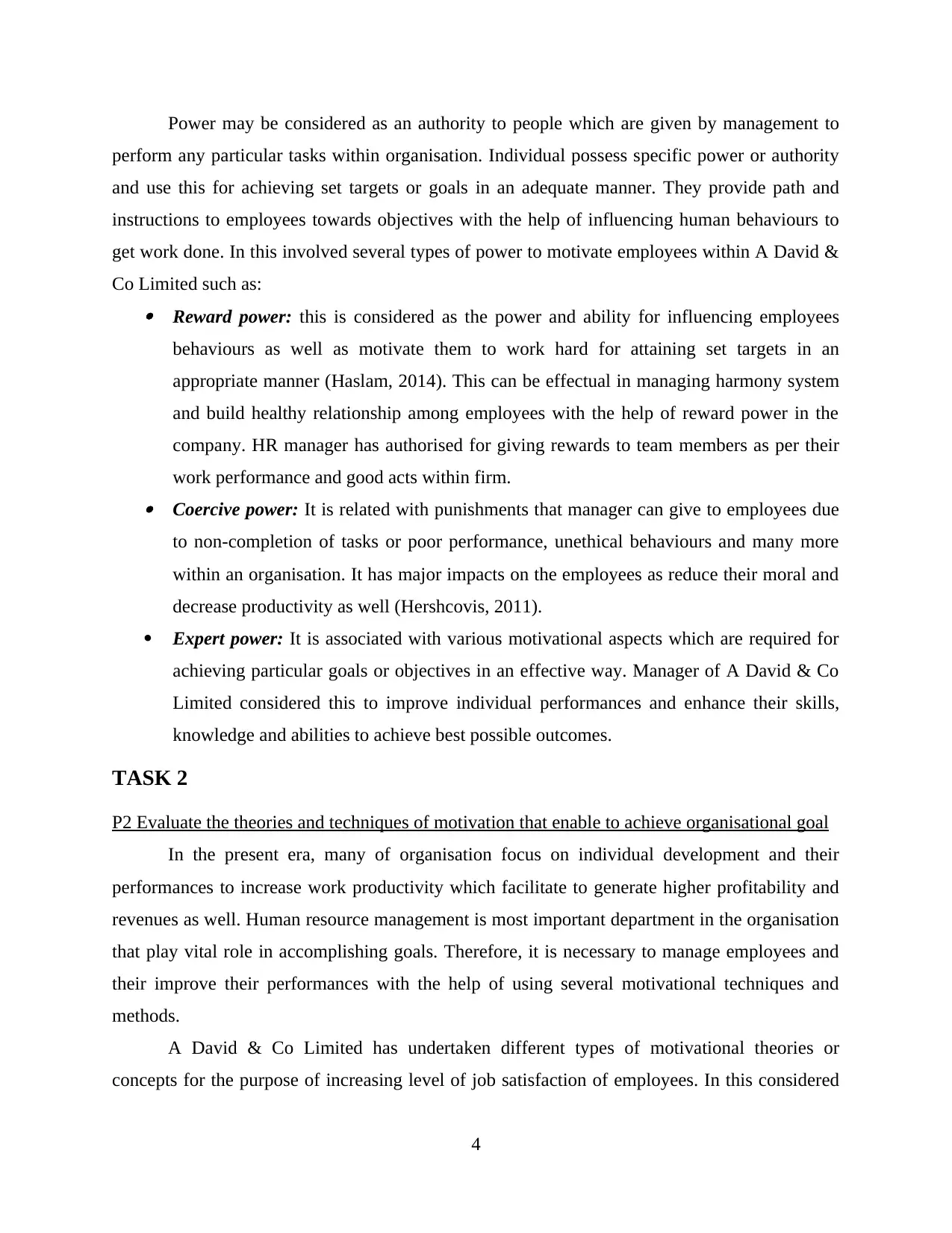
Power may be considered as an authority to people which are given by management to
perform any particular tasks within organisation. Individual possess specific power or authority
and use this for achieving set targets or goals in an adequate manner. They provide path and
instructions to employees towards objectives with the help of influencing human behaviours to
get work done. In this involved several types of power to motivate employees within A David &
Co Limited such as: Reward power: this is considered as the power and ability for influencing employees
behaviours as well as motivate them to work hard for attaining set targets in an
appropriate manner (Haslam, 2014). This can be effectual in managing harmony system
and build healthy relationship among employees with the help of reward power in the
company. HR manager has authorised for giving rewards to team members as per their
work performance and good acts within firm. Coercive power: It is related with punishments that manager can give to employees due
to non-completion of tasks or poor performance, unethical behaviours and many more
within an organisation. It has major impacts on the employees as reduce their moral and
decrease productivity as well (Hershcovis, 2011).
Expert power: It is associated with various motivational aspects which are required for
achieving particular goals or objectives in an effective way. Manager of A David & Co
Limited considered this to improve individual performances and enhance their skills,
knowledge and abilities to achieve best possible outcomes.
TASK 2
P2 Evaluate the theories and techniques of motivation that enable to achieve organisational goal
In the present era, many of organisation focus on individual development and their
performances to increase work productivity which facilitate to generate higher profitability and
revenues as well. Human resource management is most important department in the organisation
that play vital role in accomplishing goals. Therefore, it is necessary to manage employees and
their improve their performances with the help of using several motivational techniques and
methods.
A David & Co Limited has undertaken different types of motivational theories or
concepts for the purpose of increasing level of job satisfaction of employees. In this considered
4
perform any particular tasks within organisation. Individual possess specific power or authority
and use this for achieving set targets or goals in an adequate manner. They provide path and
instructions to employees towards objectives with the help of influencing human behaviours to
get work done. In this involved several types of power to motivate employees within A David &
Co Limited such as: Reward power: this is considered as the power and ability for influencing employees
behaviours as well as motivate them to work hard for attaining set targets in an
appropriate manner (Haslam, 2014). This can be effectual in managing harmony system
and build healthy relationship among employees with the help of reward power in the
company. HR manager has authorised for giving rewards to team members as per their
work performance and good acts within firm. Coercive power: It is related with punishments that manager can give to employees due
to non-completion of tasks or poor performance, unethical behaviours and many more
within an organisation. It has major impacts on the employees as reduce their moral and
decrease productivity as well (Hershcovis, 2011).
Expert power: It is associated with various motivational aspects which are required for
achieving particular goals or objectives in an effective way. Manager of A David & Co
Limited considered this to improve individual performances and enhance their skills,
knowledge and abilities to achieve best possible outcomes.
TASK 2
P2 Evaluate the theories and techniques of motivation that enable to achieve organisational goal
In the present era, many of organisation focus on individual development and their
performances to increase work productivity which facilitate to generate higher profitability and
revenues as well. Human resource management is most important department in the organisation
that play vital role in accomplishing goals. Therefore, it is necessary to manage employees and
their improve their performances with the help of using several motivational techniques and
methods.
A David & Co Limited has undertaken different types of motivational theories or
concepts for the purpose of increasing level of job satisfaction of employees. In this considered
4
⊘ This is a preview!⊘
Do you want full access?
Subscribe today to unlock all pages.

Trusted by 1+ million students worldwide
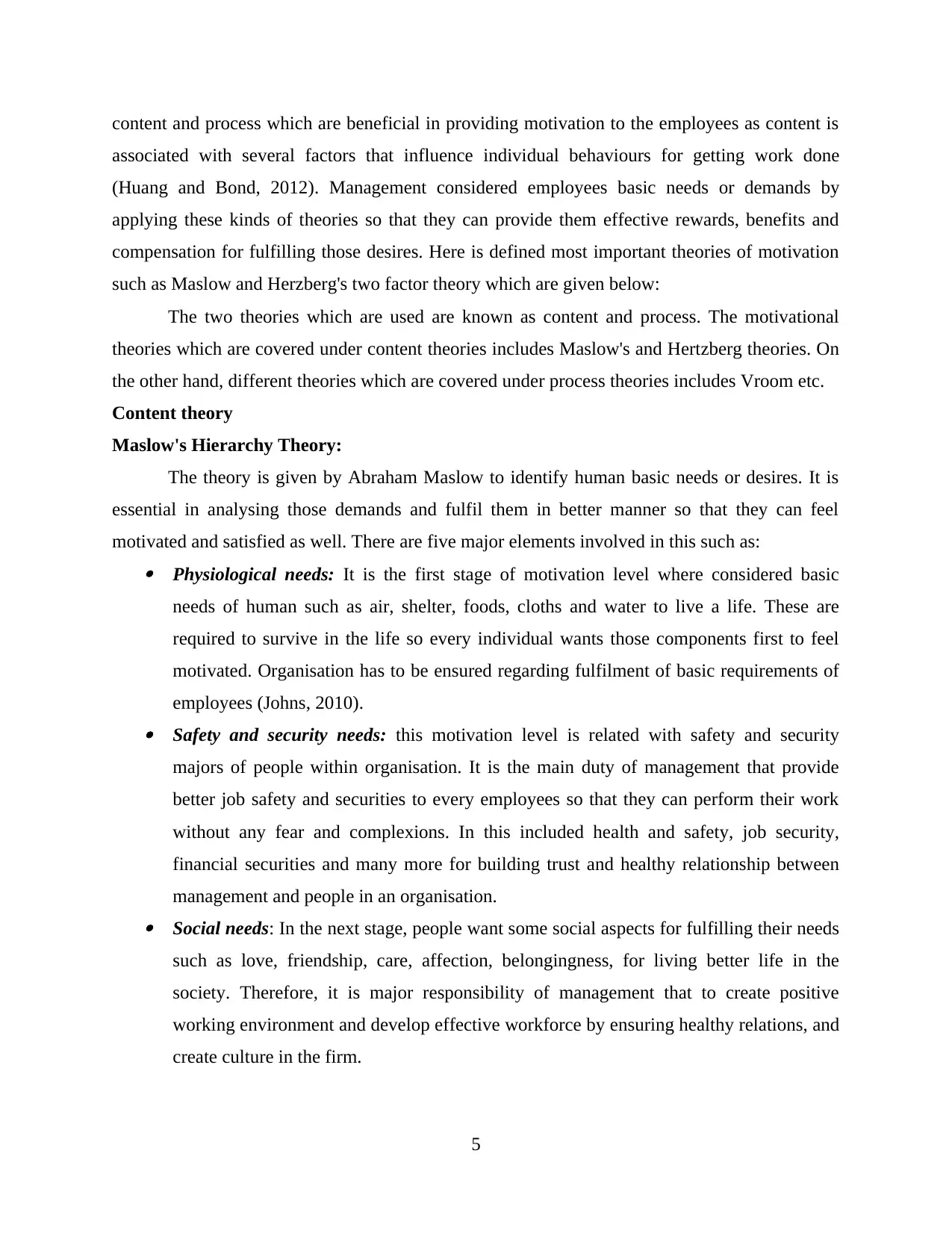
content and process which are beneficial in providing motivation to the employees as content is
associated with several factors that influence individual behaviours for getting work done
(Huang and Bond, 2012). Management considered employees basic needs or demands by
applying these kinds of theories so that they can provide them effective rewards, benefits and
compensation for fulfilling those desires. Here is defined most important theories of motivation
such as Maslow and Herzberg's two factor theory which are given below:
The two theories which are used are known as content and process. The motivational
theories which are covered under content theories includes Maslow's and Hertzberg theories. On
the other hand, different theories which are covered under process theories includes Vroom etc.
Content theory
Maslow's Hierarchy Theory:
The theory is given by Abraham Maslow to identify human basic needs or desires. It is
essential in analysing those demands and fulfil them in better manner so that they can feel
motivated and satisfied as well. There are five major elements involved in this such as: Physiological needs: It is the first stage of motivation level where considered basic
needs of human such as air, shelter, foods, cloths and water to live a life. These are
required to survive in the life so every individual wants those components first to feel
motivated. Organisation has to be ensured regarding fulfilment of basic requirements of
employees (Johns, 2010). Safety and security needs: this motivation level is related with safety and security
majors of people within organisation. It is the main duty of management that provide
better job safety and securities to every employees so that they can perform their work
without any fear and complexions. In this included health and safety, job security,
financial securities and many more for building trust and healthy relationship between
management and people in an organisation. Social needs: In the next stage, people want some social aspects for fulfilling their needs
such as love, friendship, care, affection, belongingness, for living better life in the
society. Therefore, it is major responsibility of management that to create positive
working environment and develop effective workforce by ensuring healthy relations, and
create culture in the firm.
5
associated with several factors that influence individual behaviours for getting work done
(Huang and Bond, 2012). Management considered employees basic needs or demands by
applying these kinds of theories so that they can provide them effective rewards, benefits and
compensation for fulfilling those desires. Here is defined most important theories of motivation
such as Maslow and Herzberg's two factor theory which are given below:
The two theories which are used are known as content and process. The motivational
theories which are covered under content theories includes Maslow's and Hertzberg theories. On
the other hand, different theories which are covered under process theories includes Vroom etc.
Content theory
Maslow's Hierarchy Theory:
The theory is given by Abraham Maslow to identify human basic needs or desires. It is
essential in analysing those demands and fulfil them in better manner so that they can feel
motivated and satisfied as well. There are five major elements involved in this such as: Physiological needs: It is the first stage of motivation level where considered basic
needs of human such as air, shelter, foods, cloths and water to live a life. These are
required to survive in the life so every individual wants those components first to feel
motivated. Organisation has to be ensured regarding fulfilment of basic requirements of
employees (Johns, 2010). Safety and security needs: this motivation level is related with safety and security
majors of people within organisation. It is the main duty of management that provide
better job safety and securities to every employees so that they can perform their work
without any fear and complexions. In this included health and safety, job security,
financial securities and many more for building trust and healthy relationship between
management and people in an organisation. Social needs: In the next stage, people want some social aspects for fulfilling their needs
such as love, friendship, care, affection, belongingness, for living better life in the
society. Therefore, it is major responsibility of management that to create positive
working environment and develop effective workforce by ensuring healthy relations, and
create culture in the firm.
5
Paraphrase This Document
Need a fresh take? Get an instant paraphrase of this document with our AI Paraphraser
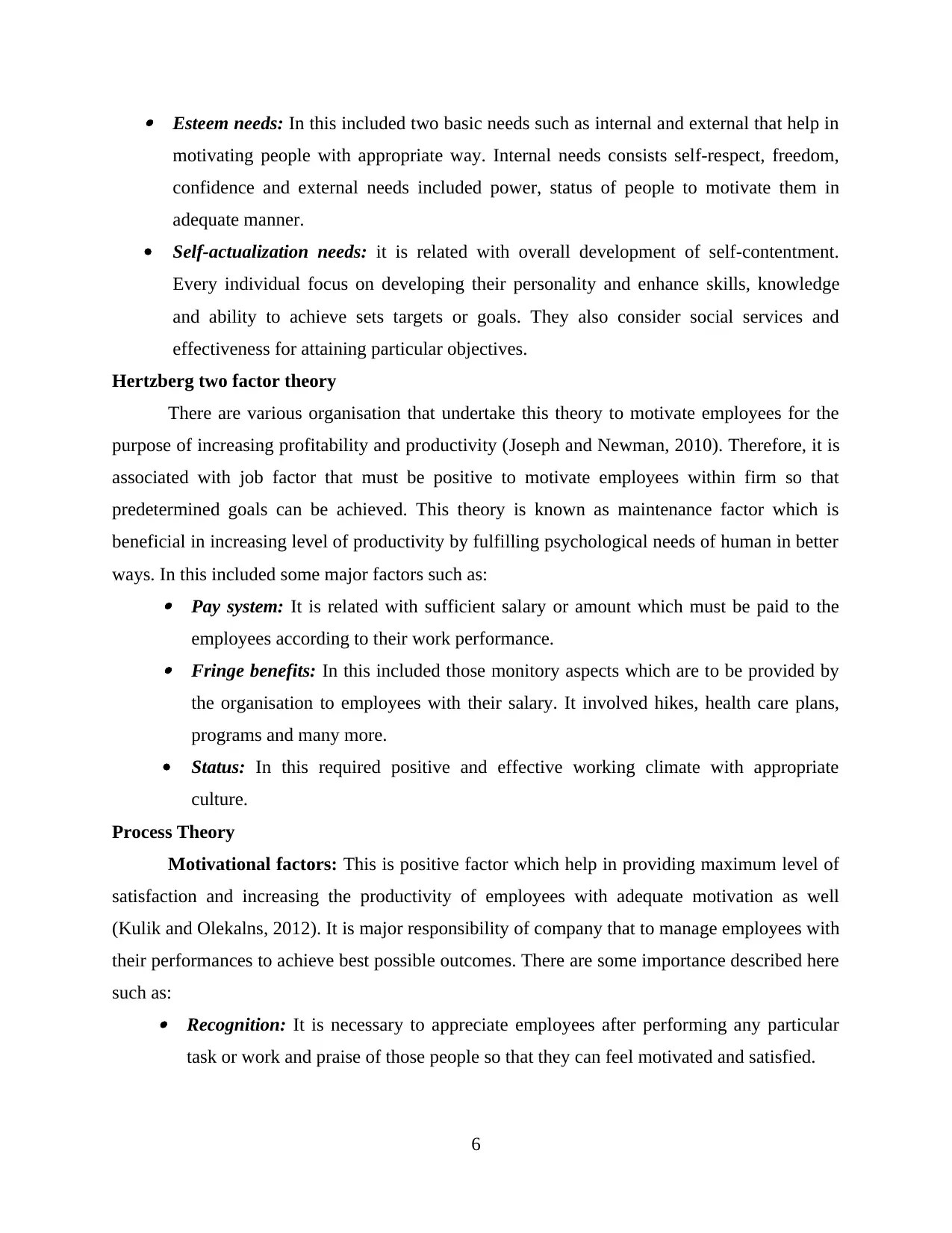
Esteem needs: In this included two basic needs such as internal and external that help in
motivating people with appropriate way. Internal needs consists self-respect, freedom,
confidence and external needs included power, status of people to motivate them in
adequate manner.
Self-actualization needs: it is related with overall development of self-contentment.
Every individual focus on developing their personality and enhance skills, knowledge
and ability to achieve sets targets or goals. They also consider social services and
effectiveness for attaining particular objectives.
Hertzberg two factor theory
There are various organisation that undertake this theory to motivate employees for the
purpose of increasing profitability and productivity (Joseph and Newman, 2010). Therefore, it is
associated with job factor that must be positive to motivate employees within firm so that
predetermined goals can be achieved. This theory is known as maintenance factor which is
beneficial in increasing level of productivity by fulfilling psychological needs of human in better
ways. In this included some major factors such as:
Pay system: It is related with sufficient salary or amount which must be paid to the
employees according to their work performance.
Fringe benefits: In this included those monitory aspects which are to be provided by
the organisation to employees with their salary. It involved hikes, health care plans,
programs and many more.
Status: In this required positive and effective working climate with appropriate
culture.
Process Theory
Motivational factors: This is positive factor which help in providing maximum level of
satisfaction and increasing the productivity of employees with adequate motivation as well
(Kulik and Olekalns, 2012). It is major responsibility of company that to manage employees with
their performances to achieve best possible outcomes. There are some importance described here
such as:
Recognition: It is necessary to appreciate employees after performing any particular
task or work and praise of those people so that they can feel motivated and satisfied.
6
motivating people with appropriate way. Internal needs consists self-respect, freedom,
confidence and external needs included power, status of people to motivate them in
adequate manner.
Self-actualization needs: it is related with overall development of self-contentment.
Every individual focus on developing their personality and enhance skills, knowledge
and ability to achieve sets targets or goals. They also consider social services and
effectiveness for attaining particular objectives.
Hertzberg two factor theory
There are various organisation that undertake this theory to motivate employees for the
purpose of increasing profitability and productivity (Joseph and Newman, 2010). Therefore, it is
associated with job factor that must be positive to motivate employees within firm so that
predetermined goals can be achieved. This theory is known as maintenance factor which is
beneficial in increasing level of productivity by fulfilling psychological needs of human in better
ways. In this included some major factors such as:
Pay system: It is related with sufficient salary or amount which must be paid to the
employees according to their work performance.
Fringe benefits: In this included those monitory aspects which are to be provided by
the organisation to employees with their salary. It involved hikes, health care plans,
programs and many more.
Status: In this required positive and effective working climate with appropriate
culture.
Process Theory
Motivational factors: This is positive factor which help in providing maximum level of
satisfaction and increasing the productivity of employees with adequate motivation as well
(Kulik and Olekalns, 2012). It is major responsibility of company that to manage employees with
their performances to achieve best possible outcomes. There are some importance described here
such as:
Recognition: It is necessary to appreciate employees after performing any particular
task or work and praise of those people so that they can feel motivated and satisfied.
6
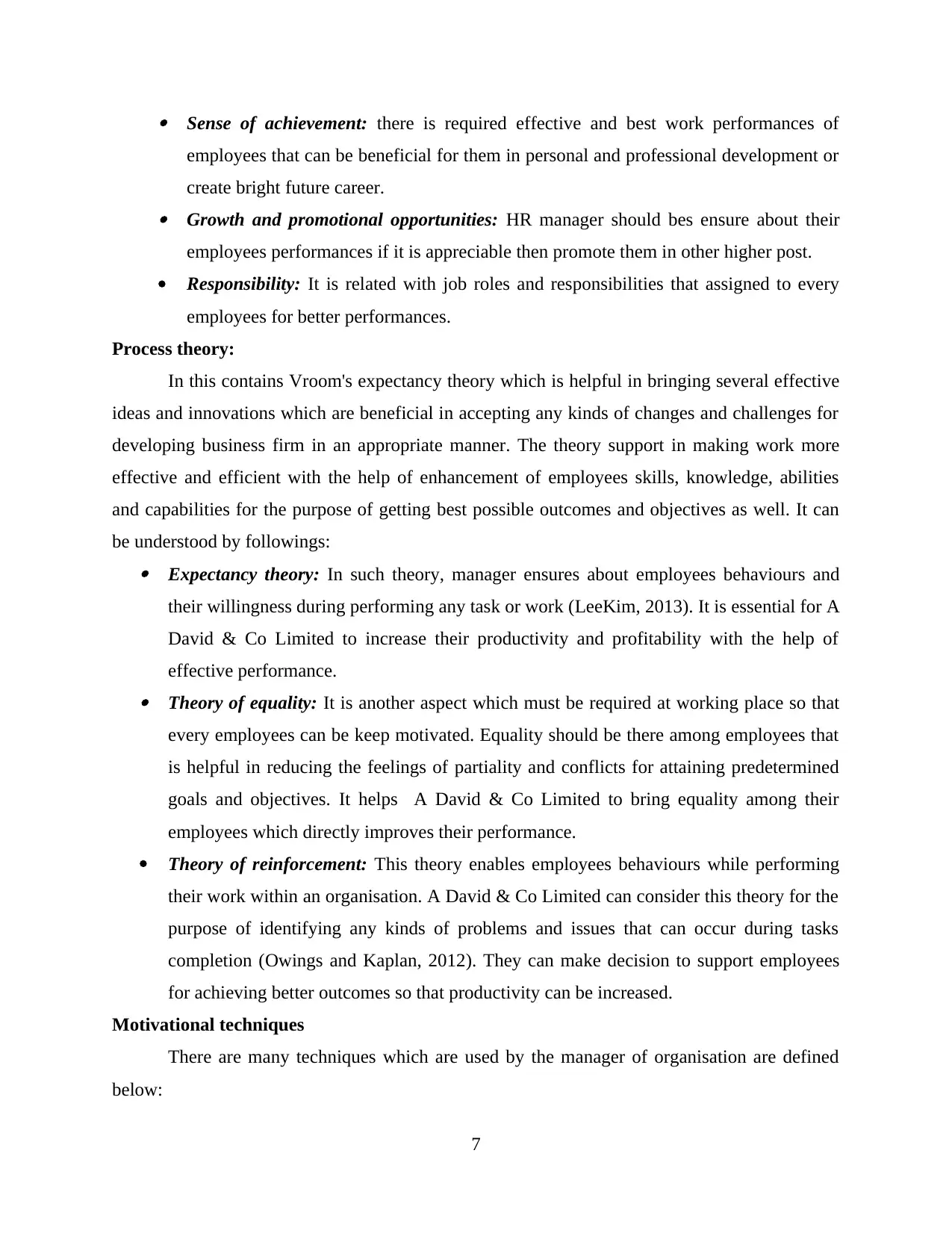
Sense of achievement: there is required effective and best work performances of
employees that can be beneficial for them in personal and professional development or
create bright future career.
Growth and promotional opportunities: HR manager should bes ensure about their
employees performances if it is appreciable then promote them in other higher post.
Responsibility: It is related with job roles and responsibilities that assigned to every
employees for better performances.
Process theory:
In this contains Vroom's expectancy theory which is helpful in bringing several effective
ideas and innovations which are beneficial in accepting any kinds of changes and challenges for
developing business firm in an appropriate manner. The theory support in making work more
effective and efficient with the help of enhancement of employees skills, knowledge, abilities
and capabilities for the purpose of getting best possible outcomes and objectives as well. It can
be understood by followings: Expectancy theory: In such theory, manager ensures about employees behaviours and
their willingness during performing any task or work (LeeKim, 2013). It is essential for A
David & Co Limited to increase their productivity and profitability with the help of
effective performance. Theory of equality: It is another aspect which must be required at working place so that
every employees can be keep motivated. Equality should be there among employees that
is helpful in reducing the feelings of partiality and conflicts for attaining predetermined
goals and objectives. It helps A David & Co Limited to bring equality among their
employees which directly improves their performance.
Theory of reinforcement: This theory enables employees behaviours while performing
their work within an organisation. A David & Co Limited can consider this theory for the
purpose of identifying any kinds of problems and issues that can occur during tasks
completion (Owings and Kaplan, 2012). They can make decision to support employees
for achieving better outcomes so that productivity can be increased.
Motivational techniques
There are many techniques which are used by the manager of organisation are defined
below:
7
employees that can be beneficial for them in personal and professional development or
create bright future career.
Growth and promotional opportunities: HR manager should bes ensure about their
employees performances if it is appreciable then promote them in other higher post.
Responsibility: It is related with job roles and responsibilities that assigned to every
employees for better performances.
Process theory:
In this contains Vroom's expectancy theory which is helpful in bringing several effective
ideas and innovations which are beneficial in accepting any kinds of changes and challenges for
developing business firm in an appropriate manner. The theory support in making work more
effective and efficient with the help of enhancement of employees skills, knowledge, abilities
and capabilities for the purpose of getting best possible outcomes and objectives as well. It can
be understood by followings: Expectancy theory: In such theory, manager ensures about employees behaviours and
their willingness during performing any task or work (LeeKim, 2013). It is essential for A
David & Co Limited to increase their productivity and profitability with the help of
effective performance. Theory of equality: It is another aspect which must be required at working place so that
every employees can be keep motivated. Equality should be there among employees that
is helpful in reducing the feelings of partiality and conflicts for attaining predetermined
goals and objectives. It helps A David & Co Limited to bring equality among their
employees which directly improves their performance.
Theory of reinforcement: This theory enables employees behaviours while performing
their work within an organisation. A David & Co Limited can consider this theory for the
purpose of identifying any kinds of problems and issues that can occur during tasks
completion (Owings and Kaplan, 2012). They can make decision to support employees
for achieving better outcomes so that productivity can be increased.
Motivational techniques
There are many techniques which are used by the manager of organisation are defined
below:
7
⊘ This is a preview!⊘
Do you want full access?
Subscribe today to unlock all pages.

Trusted by 1+ million students worldwide
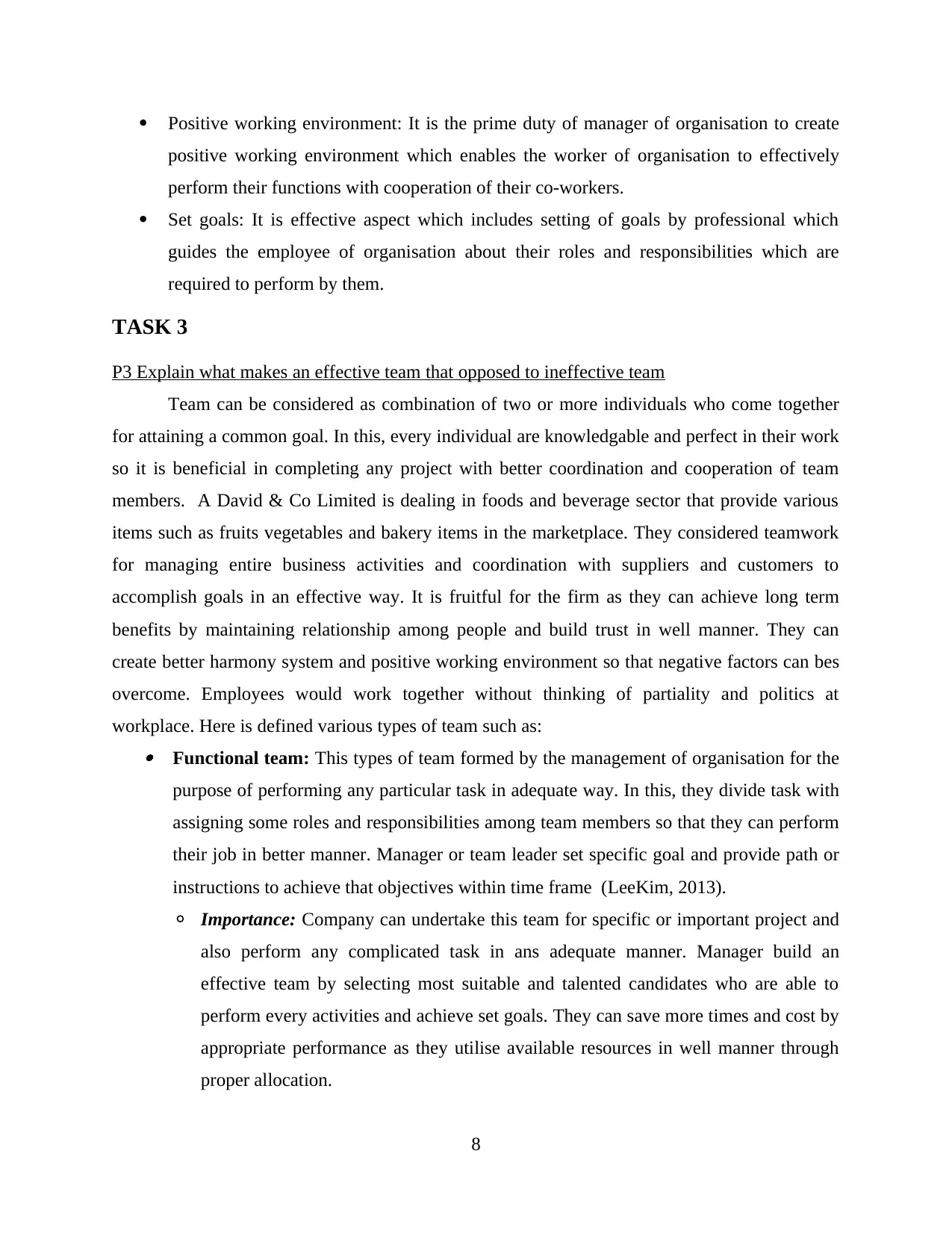
Positive working environment: It is the prime duty of manager of organisation to create
positive working environment which enables the worker of organisation to effectively
perform their functions with cooperation of their co-workers.
Set goals: It is effective aspect which includes setting of goals by professional which
guides the employee of organisation about their roles and responsibilities which are
required to perform by them.
TASK 3
P3 Explain what makes an effective team that opposed to ineffective team
Team can be considered as combination of two or more individuals who come together
for attaining a common goal. In this, every individual are knowledgable and perfect in their work
so it is beneficial in completing any project with better coordination and cooperation of team
members. A David & Co Limited is dealing in foods and beverage sector that provide various
items such as fruits vegetables and bakery items in the marketplace. They considered teamwork
for managing entire business activities and coordination with suppliers and customers to
accomplish goals in an effective way. It is fruitful for the firm as they can achieve long term
benefits by maintaining relationship among people and build trust in well manner. They can
create better harmony system and positive working environment so that negative factors can bes
overcome. Employees would work together without thinking of partiality and politics at
workplace. Here is defined various types of team such as: Functional team: This types of team formed by the management of organisation for the
purpose of performing any particular task in adequate way. In this, they divide task with
assigning some roles and responsibilities among team members so that they can perform
their job in better manner. Manager or team leader set specific goal and provide path or
instructions to achieve that objectives within time frame (LeeKim, 2013).
◦ Importance: Company can undertake this team for specific or important project and
also perform any complicated task in ans adequate manner. Manager build an
effective team by selecting most suitable and talented candidates who are able to
perform every activities and achieve set goals. They can save more times and cost by
appropriate performance as they utilise available resources in well manner through
proper allocation.
8
positive working environment which enables the worker of organisation to effectively
perform their functions with cooperation of their co-workers.
Set goals: It is effective aspect which includes setting of goals by professional which
guides the employee of organisation about their roles and responsibilities which are
required to perform by them.
TASK 3
P3 Explain what makes an effective team that opposed to ineffective team
Team can be considered as combination of two or more individuals who come together
for attaining a common goal. In this, every individual are knowledgable and perfect in their work
so it is beneficial in completing any project with better coordination and cooperation of team
members. A David & Co Limited is dealing in foods and beverage sector that provide various
items such as fruits vegetables and bakery items in the marketplace. They considered teamwork
for managing entire business activities and coordination with suppliers and customers to
accomplish goals in an effective way. It is fruitful for the firm as they can achieve long term
benefits by maintaining relationship among people and build trust in well manner. They can
create better harmony system and positive working environment so that negative factors can bes
overcome. Employees would work together without thinking of partiality and politics at
workplace. Here is defined various types of team such as: Functional team: This types of team formed by the management of organisation for the
purpose of performing any particular task in adequate way. In this, they divide task with
assigning some roles and responsibilities among team members so that they can perform
their job in better manner. Manager or team leader set specific goal and provide path or
instructions to achieve that objectives within time frame (LeeKim, 2013).
◦ Importance: Company can undertake this team for specific or important project and
also perform any complicated task in ans adequate manner. Manager build an
effective team by selecting most suitable and talented candidates who are able to
perform every activities and achieve set goals. They can save more times and cost by
appropriate performance as they utilise available resources in well manner through
proper allocation.
8
Paraphrase This Document
Need a fresh take? Get an instant paraphrase of this document with our AI Paraphraser
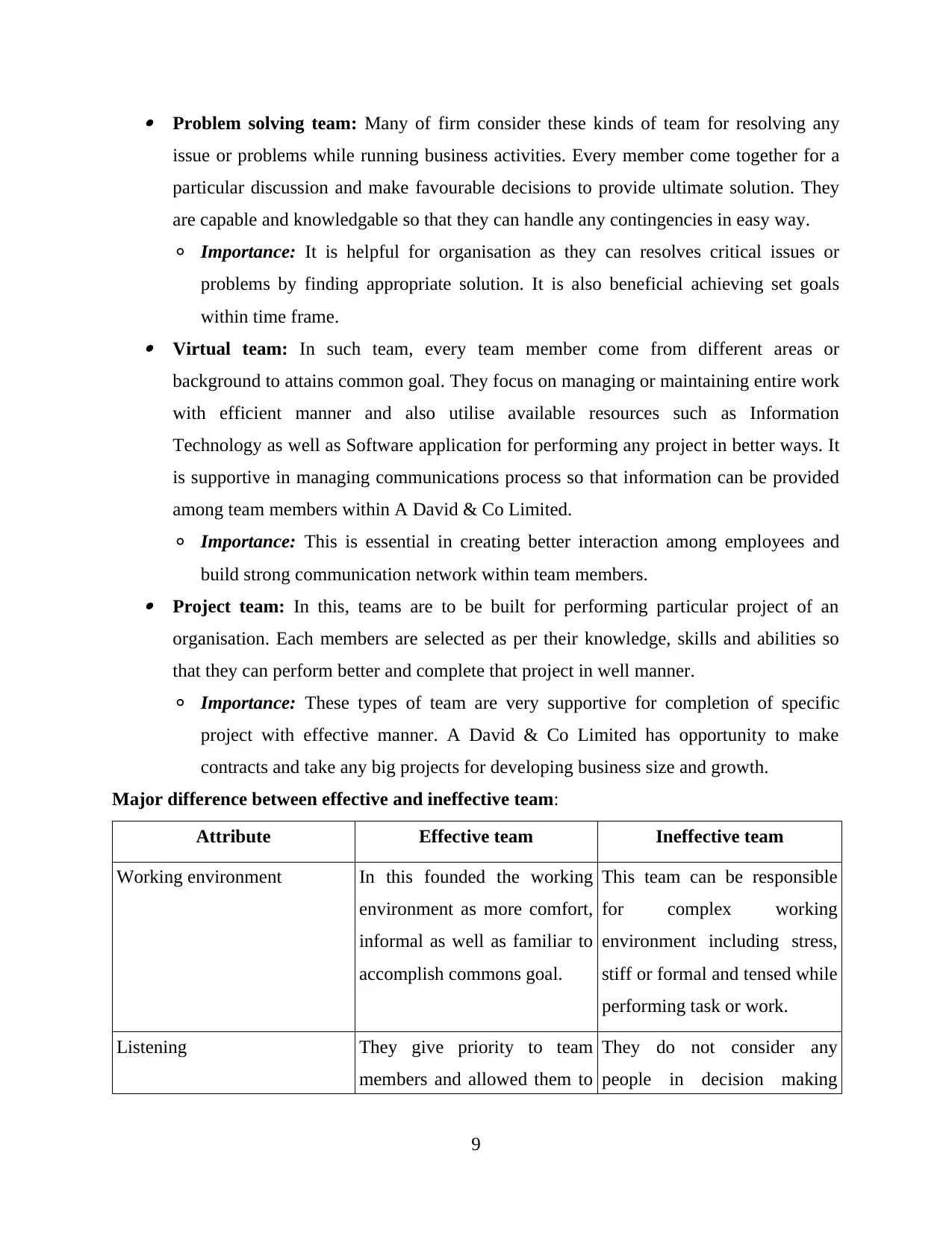
Problem solving team: Many of firm consider these kinds of team for resolving any
issue or problems while running business activities. Every member come together for a
particular discussion and make favourable decisions to provide ultimate solution. They
are capable and knowledgable so that they can handle any contingencies in easy way.
◦ Importance: It is helpful for organisation as they can resolves critical issues or
problems by finding appropriate solution. It is also beneficial achieving set goals
within time frame. Virtual team: In such team, every team member come from different areas or
background to attains common goal. They focus on managing or maintaining entire work
with efficient manner and also utilise available resources such as Information
Technology as well as Software application for performing any project in better ways. It
is supportive in managing communications process so that information can be provided
among team members within A David & Co Limited.
◦ Importance: This is essential in creating better interaction among employees and
build strong communication network within team members. Project team: In this, teams are to be built for performing particular project of an
organisation. Each members are selected as per their knowledge, skills and abilities so
that they can perform better and complete that project in well manner.
◦ Importance: These types of team are very supportive for completion of specific
project with effective manner. A David & Co Limited has opportunity to make
contracts and take any big projects for developing business size and growth.
Major difference between effective and ineffective team:
Attribute Effective team Ineffective team
Working environment In this founded the working
environment as more comfort,
informal as well as familiar to
accomplish commons goal.
This team can be responsible
for complex working
environment including stress,
stiff or formal and tensed while
performing task or work.
Listening They give priority to team
members and allowed them to
They do not consider any
people in decision making
9
issue or problems while running business activities. Every member come together for a
particular discussion and make favourable decisions to provide ultimate solution. They
are capable and knowledgable so that they can handle any contingencies in easy way.
◦ Importance: It is helpful for organisation as they can resolves critical issues or
problems by finding appropriate solution. It is also beneficial achieving set goals
within time frame. Virtual team: In such team, every team member come from different areas or
background to attains common goal. They focus on managing or maintaining entire work
with efficient manner and also utilise available resources such as Information
Technology as well as Software application for performing any project in better ways. It
is supportive in managing communications process so that information can be provided
among team members within A David & Co Limited.
◦ Importance: This is essential in creating better interaction among employees and
build strong communication network within team members. Project team: In this, teams are to be built for performing particular project of an
organisation. Each members are selected as per their knowledge, skills and abilities so
that they can perform better and complete that project in well manner.
◦ Importance: These types of team are very supportive for completion of specific
project with effective manner. A David & Co Limited has opportunity to make
contracts and take any big projects for developing business size and growth.
Major difference between effective and ineffective team:
Attribute Effective team Ineffective team
Working environment In this founded the working
environment as more comfort,
informal as well as familiar to
accomplish commons goal.
This team can be responsible
for complex working
environment including stress,
stiff or formal and tensed while
performing task or work.
Listening They give priority to team
members and allowed them to
They do not consider any
people in decision making
9
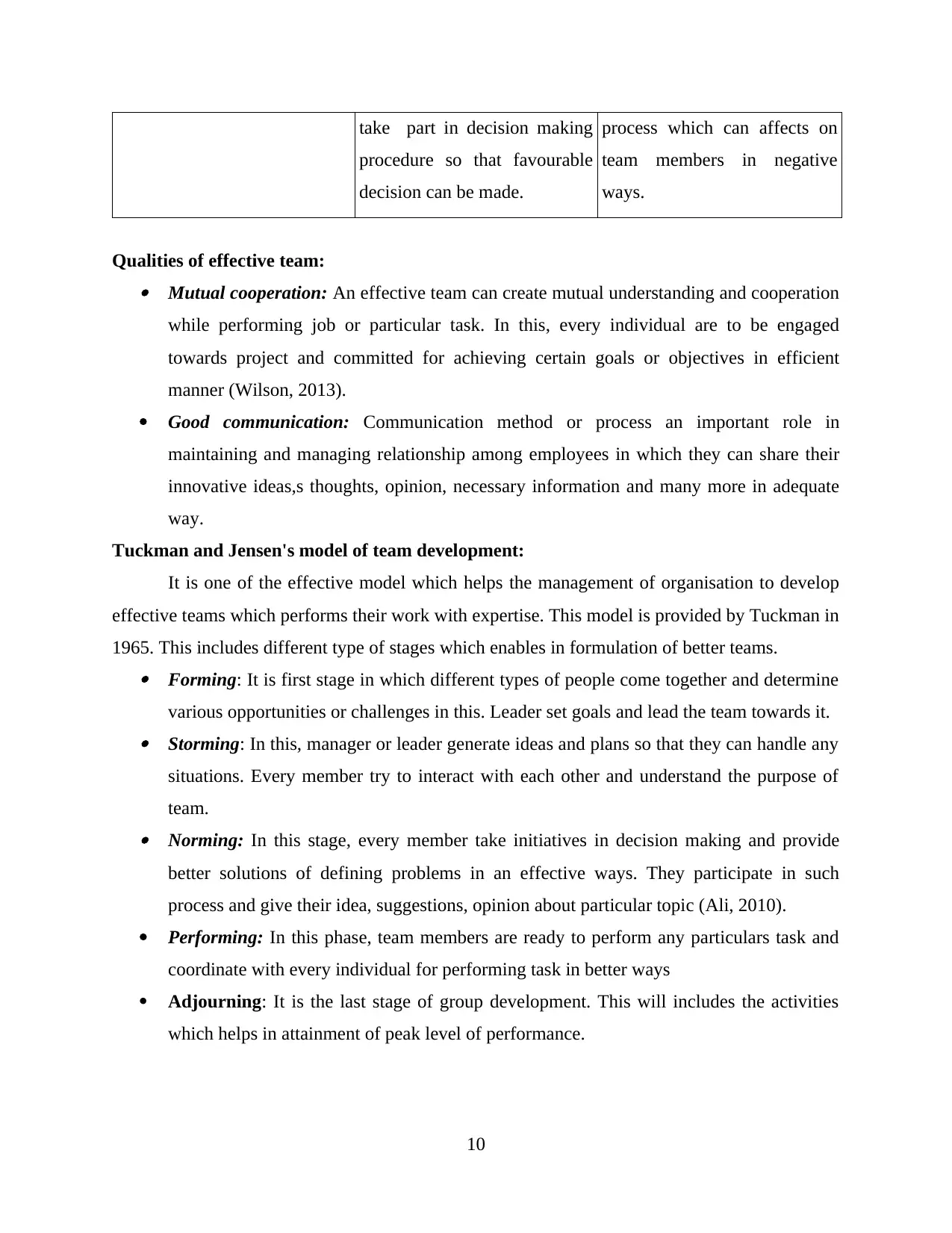
take part in decision making
procedure so that favourable
decision can be made.
process which can affects on
team members in negative
ways.
Qualities of effective team: Mutual cooperation: An effective team can create mutual understanding and cooperation
while performing job or particular task. In this, every individual are to be engaged
towards project and committed for achieving certain goals or objectives in efficient
manner (Wilson, 2013).
Good communication: Communication method or process an important role in
maintaining and managing relationship among employees in which they can share their
innovative ideas,s thoughts, opinion, necessary information and many more in adequate
way.
Tuckman and Jensen's model of team development:
It is one of the effective model which helps the management of organisation to develop
effective teams which performs their work with expertise. This model is provided by Tuckman in
1965. This includes different type of stages which enables in formulation of better teams. Forming: It is first stage in which different types of people come together and determine
various opportunities or challenges in this. Leader set goals and lead the team towards it. Storming: In this, manager or leader generate ideas and plans so that they can handle any
situations. Every member try to interact with each other and understand the purpose of
team. Norming: In this stage, every member take initiatives in decision making and provide
better solutions of defining problems in an effective ways. They participate in such
process and give their idea, suggestions, opinion about particular topic (Ali, 2010).
Performing: In this phase, team members are ready to perform any particulars task and
coordinate with every individual for performing task in better ways
Adjourning: It is the last stage of group development. This will includes the activities
which helps in attainment of peak level of performance.
10
procedure so that favourable
decision can be made.
process which can affects on
team members in negative
ways.
Qualities of effective team: Mutual cooperation: An effective team can create mutual understanding and cooperation
while performing job or particular task. In this, every individual are to be engaged
towards project and committed for achieving certain goals or objectives in efficient
manner (Wilson, 2013).
Good communication: Communication method or process an important role in
maintaining and managing relationship among employees in which they can share their
innovative ideas,s thoughts, opinion, necessary information and many more in adequate
way.
Tuckman and Jensen's model of team development:
It is one of the effective model which helps the management of organisation to develop
effective teams which performs their work with expertise. This model is provided by Tuckman in
1965. This includes different type of stages which enables in formulation of better teams. Forming: It is first stage in which different types of people come together and determine
various opportunities or challenges in this. Leader set goals and lead the team towards it. Storming: In this, manager or leader generate ideas and plans so that they can handle any
situations. Every member try to interact with each other and understand the purpose of
team. Norming: In this stage, every member take initiatives in decision making and provide
better solutions of defining problems in an effective ways. They participate in such
process and give their idea, suggestions, opinion about particular topic (Ali, 2010).
Performing: In this phase, team members are ready to perform any particulars task and
coordinate with every individual for performing task in better ways
Adjourning: It is the last stage of group development. This will includes the activities
which helps in attainment of peak level of performance.
10
⊘ This is a preview!⊘
Do you want full access?
Subscribe today to unlock all pages.

Trusted by 1+ million students worldwide
1 out of 16
Related Documents
Your All-in-One AI-Powered Toolkit for Academic Success.
+13062052269
info@desklib.com
Available 24*7 on WhatsApp / Email
![[object Object]](/_next/static/media/star-bottom.7253800d.svg)
Unlock your academic potential
Copyright © 2020–2026 A2Z Services. All Rights Reserved. Developed and managed by ZUCOL.





